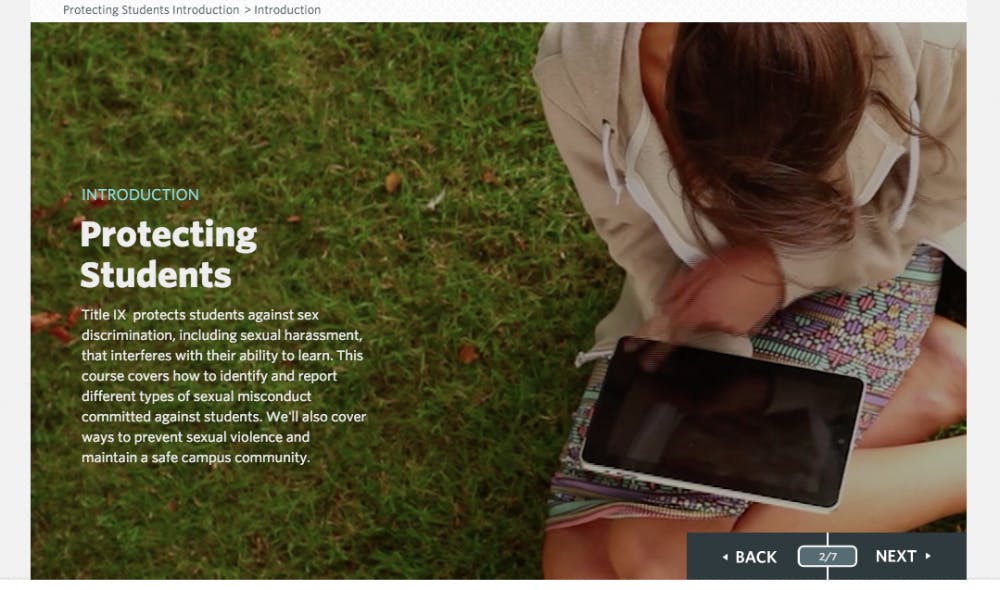In recent years, sexual assault prevention has become one of the fastest growing industries in the market.
From date-rape detecting nail polishes to apps that will record whether or not someone gave consent, the number of products to decrease the amount of sexual assaults has expanded from the niche market it once was.
In March 2013, President Barack Obama signed the Campus SaVE Act, an amendment to the Jeanne Clery Act. This meant that secondary schools receiving financial aid must offer both staff and students sexual assault preventative programs.
Ball State met this requirement by implementing the Think About It program in August 2014.
However, a 2014 study found that brief, one-session educational interventions did not have any lasting impact on behavior. In-person, longer programs that have one to three sessions might work, the study said.
Think About It falls somewhere in between those two categories.
But for the program to be effective, students have to complete the online course. In the 2014-15 school year, when the program was first implemented, 86.7 percent of incoming freshman completed it. This year, only 57 percent did.
Think About It and other similar programs have been picked up by universities around the nation. More than 650 institutions across the country have turned to Haven, a program very similar to Think About It. While the price of Haven varies by size of the institution, it usually costs between $10,000 to $20,000 per year.
Ball State also offers four similar programs to Think About It and 11 outreach programs free of charge for faulty and students.
One of these programs is Peer Health Educators, a student-taught program whose mission is to promote healthy lifestyles with outreach programs and role models.
“We try to make the programs interactive by playing games, asking questions and giving away free prizes," said Grace Holihen, vice president of Peer Health Educators. "Typical audiences include residence halls, classrooms and student organizations."
Aside from programs, other inventions have been developed as well, such as Undercover Colors, founded by four students at North Carolina State University. They developed a nail polish that changes color when it comes in contact with common date rape drugs.
However, detecting drugs in a drink does not prevent sexual assault. It only warns the person who has the nail polish, not ensuring that whoever put the drugs in the drink won’t drug another person who isn't wearing the nail polish.
Chadwick Menning, a sociology professor, said the responsibility needs to be shifted away from the victim, and on to the perpetrator.
“It's important that we pursue the kind of cultural efforts that we see with bystander intervention, absolutely that’s where the focus needs to be," Menning said. "Culture change happens very slowly and you can work on that changing over time.”
Along with products like the nail polish, mobile apps are also making headlines for advances in safety.
In July 2011, Vice President Joe Biden launched the Apps Against Abuse challenge. This was a nationwide competition to see who could create the best app that would combat dating violence and sexual assault. The winners of the competition were Circle of 6 and OnWatchOnCampus. Both apps are free and focus on being able to contact reliable people in times of need.
Other apps, such as We-Consent, focus more on the consent side than the safety side.
In the app, users are asked to say the name of the person with whom they would like to have sexual relations. Then they put the intended person on camera as the app asks them the question and records them either answering yes or no. If the intended person does not give a definitive ‘yes’ the previous videos are then destroyed and the app ask the users to try again.
However, if consent is granted, the videos are saved and the app tells them to “have fun.” The app doesn’t account for if the user were to change their mind after originally giving consent.
But this app has received some backlash. In an interview with NPR in August, Michael Lissack, the developer of the app, said Apple called it "icky" and refused to put it in its App Store.
In general, students are divided on businesses profiting off of sexual assault prevention.
“I think that it should all be non-for-profit," said junior Beth Muller. "I just think that’s such an important thing that overall it should just be something that everyone focuses on, not just for profit."
However, first year grad student Hannah Garner said she has doubts about whether or not the companies are just in it for the money.
“I don’t really mind if they profit from it," Garner said. "I think that what they're doing is for a good cause. I realize they're probably not in it just for the money.”





